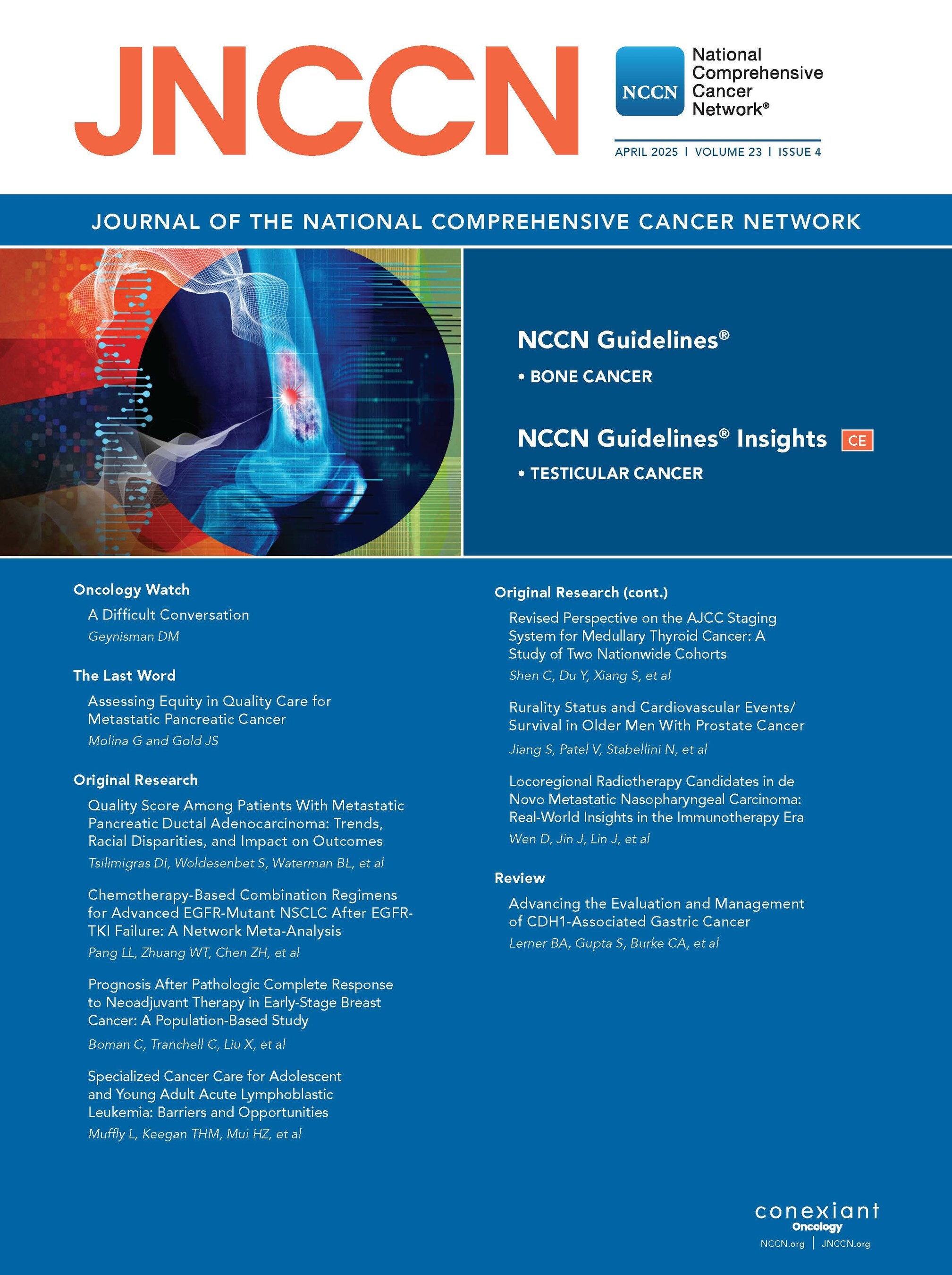Researchers at The Ohio State University Wexner Medical Center and James Comprehensive Cancer Center found socially vulnerable patients with metastatic pancreatic cancer were significantly less likely to receive key components of quality care and had poorer survival.
PLYMOUTH MEETING, Pa., April 9, 2025 /PRNewswire-HISPANIC PR WIRE/– New research in the April 2025 issue of JNCCN—Journal of the National Comprehensive Cancer Network found significant disparities based on race, socioeconomic status, and other factors when it came to quality of care and outcomes for people with metastatic pancreatic adenocarcinoma (mPDAC)—which is associated with very high cancer mortality. The researchers used the Surveillance, Epidemiology, and End Results (SEER)-Medicare database to study 14,147 patients who were diagnosed with mPDAC between 2005-2019. Quality scores were determined based on those who received 1) guideline-concordant systemic therapy, 2) palliative care, and 3) a cancer-specific survival of more than 12 months.

Patients with a higher measure on the Social Vulnerability Index (SVI) were 30% less likely to experience at least one of the three quality indicators. Notably, when race and economic status were separated out—individuals who were a member of an underserved racial or ethnic group were 25% less likely to experience one or more quality indicator, regardless of income. Lower socioeconomic status correlated with a 34% lower chance of experiencing a quality indicator, independent of race.
“The results of our study highlight the need for targeted interventions to mitigate disparities in cancer care,” said lead author Diamantis Tsilimigras, MD, PhD, The Ohio State University Wexner Medical Center and James Comprehensive Cancer Center. “Federal policies that expand Medicaid or possibly expand Medicare coverage for palliative care can help reduce disparities. Furthermore, policies that address social determinants of health—including financial aid for the most vulnerable populations as well as understanding and addressing potential implicit biases relative to treatment recommendations—could help address disparities in equal access to care.”
The study found that patients who did receive appropriate systemic and/or palliative care were more likely to survive longer than a year after being diagnosed. They also found improvement over time, across the study period from 2005 to 2019, in both quality scores and longevity.
“Ensuring that all patients, regardless of their background, receive guideline-concordant care is important to improve outcomes for patients with metastatic pancreatic cancer,” added senior author Timothy M. Pawlik, MD, PhD, MPH, MTS, MBA, The Ohio State University Wexner Medical Center and James Comprehensive Cancer Center. “We found that while adherence to NCCN Guidelines improved over time, there remain significant disparities in the receipt of guideline-concordant care among patients with metastatic pancreatic cancer which can, in turn, affect outcomes.”
Jason S. Gold, MD, Associate Professor, Surgery, Harvard Medical School—who was not involved in this research—commented: “There is increasing recognition of the persistence of disparities in treatment and outcomes for pancreatic cancer. This study adds to this body of knowledge by showing that social vulnerability, unmarried status, and lower income were all independently associated with lower quality care for metastatic pancreatic ductal adenocarcinoma.”
Dr. Gold is the author of a longer response to this study that can also be found in the April issue of JNCCN. To read the entire study “Quality Score Among Patients With Metastatic Pancreatic Adenocarcinoma: Trends, Racial Disparities, and Impact on Outcomes” and the corresponding “The Last Word” commentary, visit JNCCN.org.
About JNCCN—Journal of the National Comprehensive Cancer Network
More than 25,000 oncologists and other cancer care professionals across the United States read JNCCN—Journal of the National Comprehensive Cancer Network. This peer-reviewed, indexed medical journal provides the latest information about innovation in translational medicine, and scientific studies related to oncology health services research, including quality care and value, bioethics, comparative and cost effectiveness, public policy, and interventional research on supportive care and survivorship. JNCCN features updates on the NCCN Clinical Practice Guidelines in Oncology (NCCN Guidelines®), review articles elaborating on guidelines recommendations, health services research, and case reports highlighting molecular insights in patient care. JNCCN is published by Harborside/BroadcastMed. Visit JNCCN.org. To inquire if you are eligible for a FREE subscription to JNCCN, visit NCCN.org/jnccn/subscribe. Follow JNCCN at x.com/JNCCN.
About the National Comprehensive Cancer Network
The National Comprehensive Cancer Network® (NCCN®) is marking 30 years as a not-for-profit alliance of leading cancer centers devoted to patient care, research, and education. NCCN is dedicated to defining and advancing quality, effective, equitable, and accessible cancer care and prevention so all people can live better lives. The NCCN Clinical Practice Guidelines in Oncology (NCCN Guidelines®) provide transparent, evidence-based, expert consensus-driven recommendations for cancer treatment, prevention, and supportive services; they are the recognized standard for clinical direction and policy in cancer management and the most thorough and frequently-updated clinical practice guidelines available in any area of medicine. The NCCN Guidelines for Patients® provide expert cancer treatment information to inform and empower patients and caregivers, through support from the NCCN Foundation®. NCCN also advances continuing education, global initiatives, policy, and research collaboration and publication in oncology. Visit NCCN.org for more information.
Media Contact:
Rachel Darwin
267-622-6624
[email protected]

Photo – https://mma.prnewswire.com/media/2660211/National_Comprehensive_Cancer_Network__Cover__JNCCN_April_2025.jpg
Logo – https://mma.prnewswire.com/media/441768/NCCN_Logo_v2.jpg
SOURCE National Comprehensive Cancer Network







